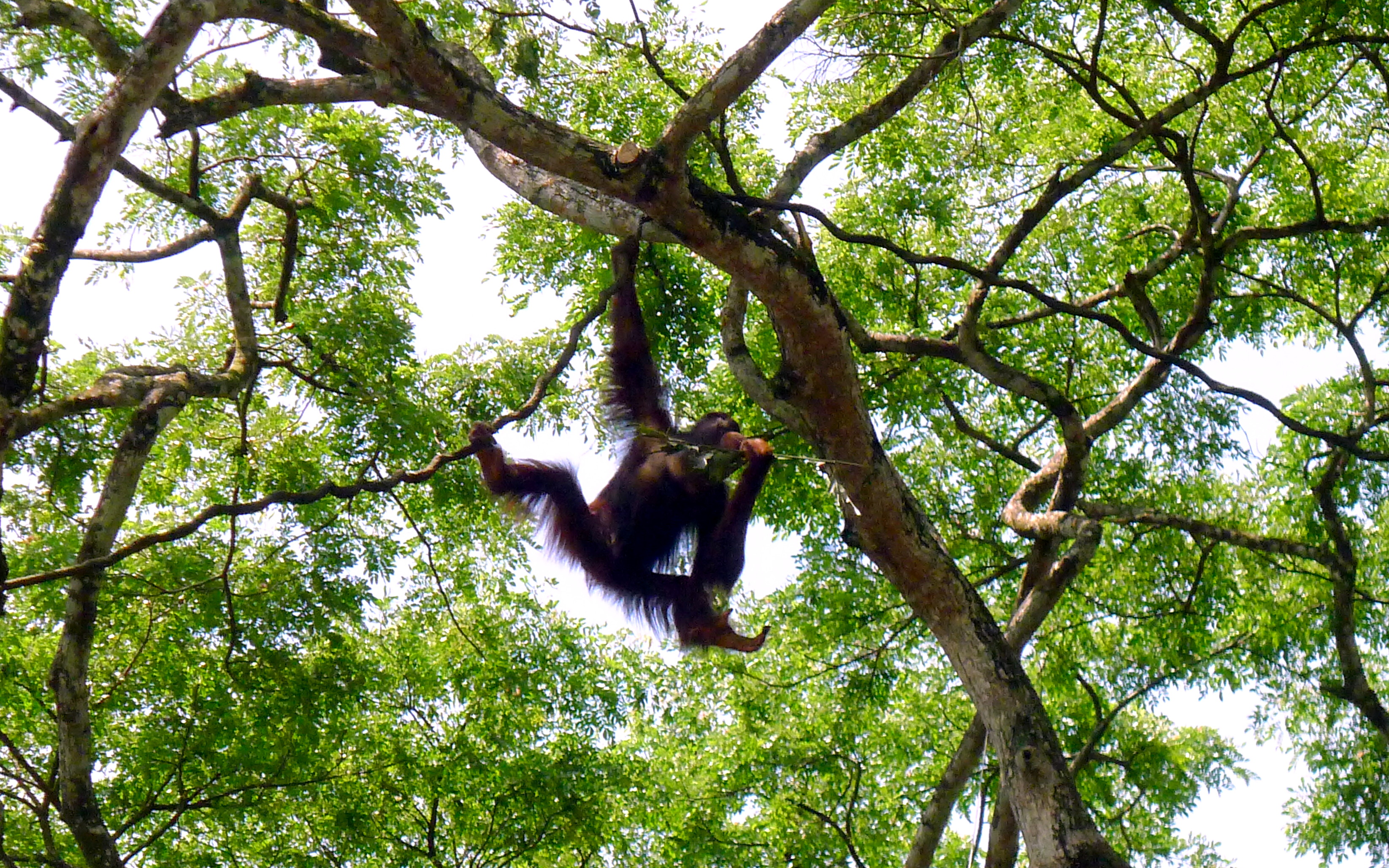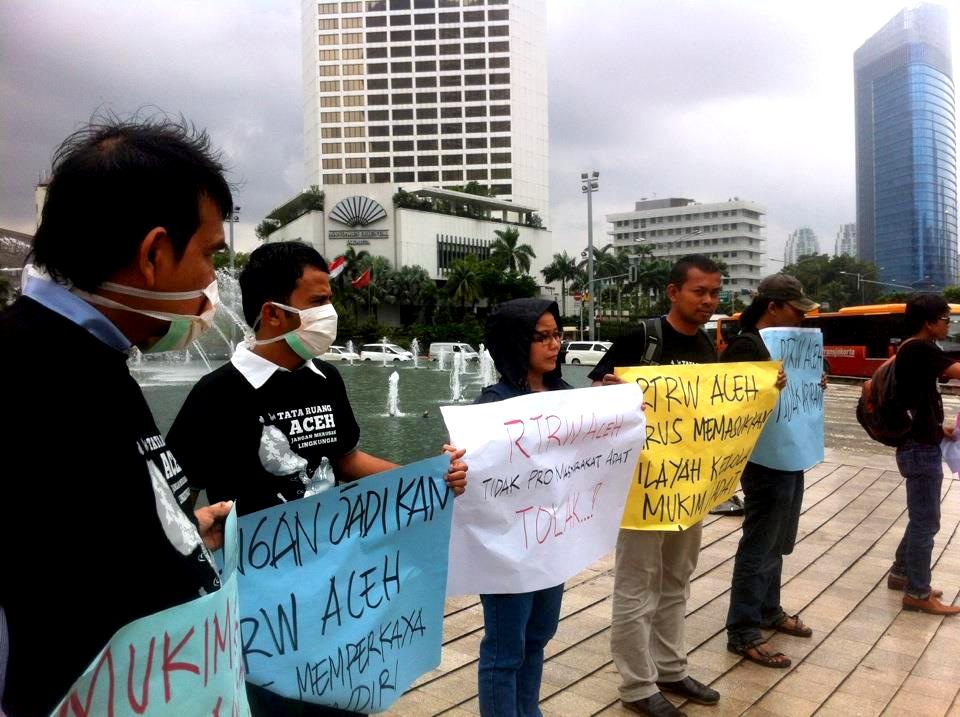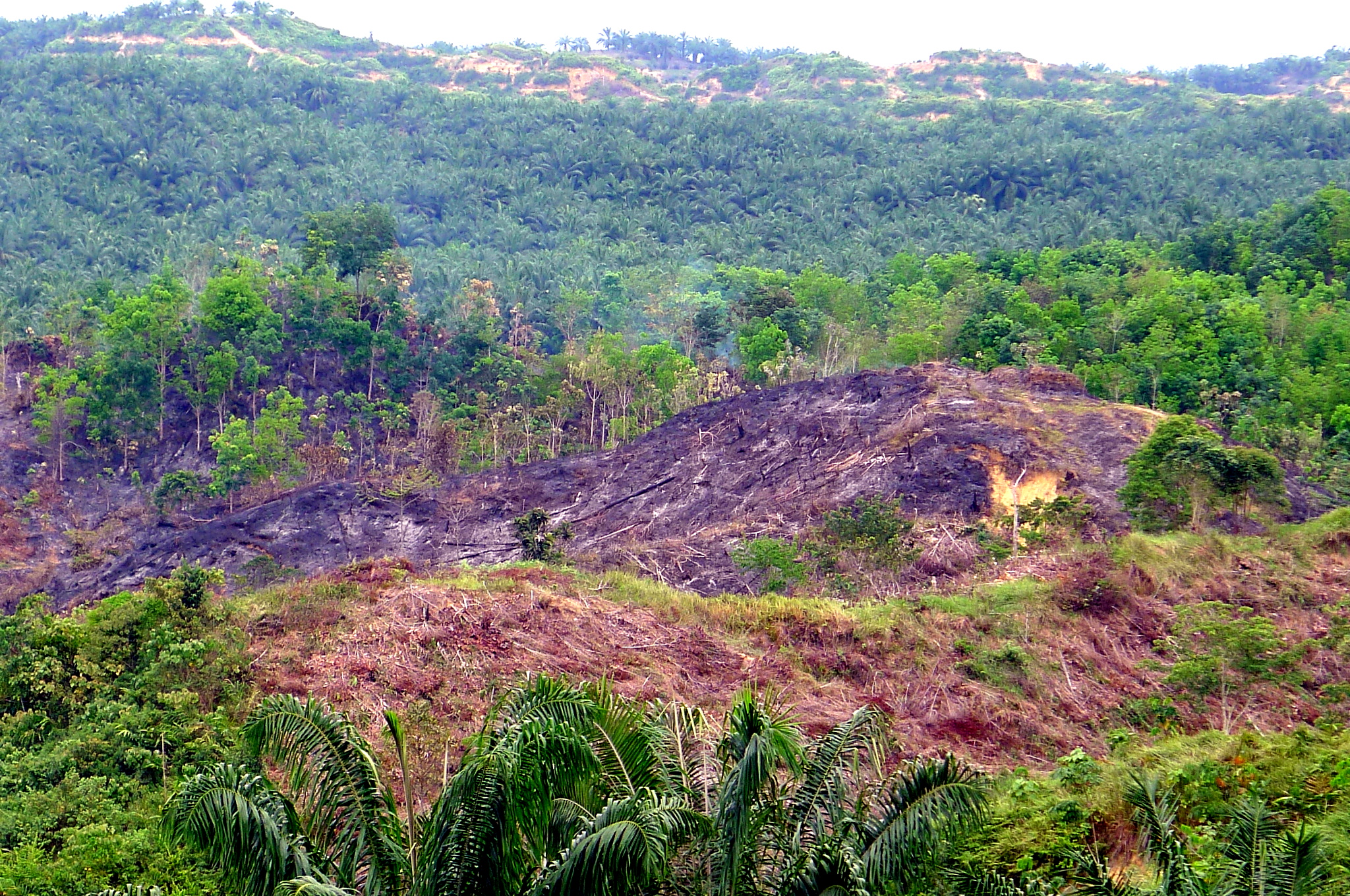印尼法院日前對於棕櫚油企業PT Kallista Alam違法焚燒大片赤巴(Tripa)泥炭地森林做出判決。由印尼環境部起訴的罪名成立,PT Kallista Alam面臨940萬美元的罰款,法院並下令沒收該公司5769公頃的所有土地,且須支付2080萬美元的費用以復育遭破壞的雨林,每延遲繳納罰款與復育費一天,就必須支付423美元。
猩猩、犀、象、虎共存泥炭地森林 世界唯一
赤巴泥炭地森林位於印尼蘇門答臘列尤擇(Leuser)生態區內,是紅毛猩猩與蘇門答臘虎的棲地,也是世上唯一可同時發現犀牛、大象、老虎、紅毛猩猩的地方。
蘇門答臘過去曾經有約6500隻紅毛猩猩,赤巴是其中一個主要棲地,1990年代尚有2000至3000隻紅毛猩猩在此棲息,時至今日僅剩數百隻存活。科學家表示可能有高達100隻紅毛猩猩死於雨林焚燒,且紅毛猩猩不是唯一遭受雨林焚燒迫害的物種,當地的蘇門答臘虎、馬來熊以及其他數種保育類動物也身受其害。
蘇門答臘紅毛猩猩保育計畫負責人Ian Singleton說,「赤巴地區是蘇門達臘境內唯三保有紅毛猩猩的泥炭地雨林。泥炭地雨林的每平方公里紅毛猩猩密度是旱地雨林的4倍之多,這些泥炭地森林已被認定為紅毛猩猩的首要棲地。」
棕櫚油商未授權先開墾 遭法院駁回
2011年8月時,PT Kallista Alam曾在亞齊政府的授權下取得開墾1605公頃赤巴雨林的權利。但在國際施壓下,印尼環境部決定調查該企業的開發許可證。政府代表2012年9月根據棉蘭高等行政法院的判決,證明許可證為非法,並撤銷其權利。
在PT Kallista Alam的上訴下,2013年5月亞齊行政法院駁回了撤銷令。但有消息指出,PT Kallista Alam在取得許可證之前,就已經在赤巴雨林開始焚林行為與開墾棕櫚林地。
根據訴訟中的證詞,PT Kallista Alam在列尤擇生態區的許可已經在2011年2月到期且未獲當局展延。檢察官表示,「這意味PT Kallista Alam從來沒有正式取得開墾雨林的許可。」米拉務地方法院的裁判長也說:「PT Kallista Alam非法焚燒雨林地帶的行為,已經違反了2009年第32號關於環境保護與管理的國家法規。」
PT Kallista Alam則否認違反任何環境相關的法規,並聲稱自身行為並未對環境造成污染與破壞。對於環境部的指控,該企業表示內容不夠明確且缺乏確切證據,因此不具有法律基礎,並表示在赤巴地區的焚林開墾行為都在合法範圍內。
開創性判決 警示相關企業
印尼環境論壇亞齊支部負責人Muhammad Nur表示,「這樣開創性的判決對那些在亞齊摧毀保護區雨林,且相信他們可以置身事外的企業,如PT Surya Panen Subur II、PT Dua Perkasa Lestari、PT Gelora Sawita Makmur和PT Cemerlang Abadi無疑是一道警示,他們都將面臨金額龐大的罰款,有些公司負責人與高階主管也可能面臨個人刑期。」
永續發展與文化交流基金會(Paneco Foundation)的Graham Usher也說:「列尤擇生態區對當地甚至是國際,都提供了鉅額的環境福利。亞齊地區與列尤擇生態區相關的收益每年就超過4億美元,若將其碳匯功能對減緩氣候變遷的助益納入的話,每年的效益可能超過數十億美元。」
Muhammad Nur補充,亞齊省議會正在推動一個新的區域計劃,這個計畫完全忽略列尤擇生態圈的保育地位,反而打算開放現有保育林,開拓道路取得林產和礦產。這將終結亞齊永續發展的機會並進一步破壞許多重要流域生態,發生洪災、土石流與其他天災的機率將大幅增加。「我們希望藉由PT Kallista Alam的判決案例可以作為一個警告,我們很感謝法官在這種情況下,做了一個公正,公平的裁決。」他說。
印尼雨林快速消失 棕櫚油業是主因
在1960年代,印尼還有82%的國土被雨林覆蓋,但如今卻是森林砍伐速度最快的國家之一;過去亞齊曾是蘇門答臘島內最多雨林覆蓋的省分,但僅在20年間就失去超過三分之一。據估計,2000至2010年間就有112.5萬公頃的雨林消失。
根據聯合國環境規劃署2007年公佈的報告,棕櫚油產業是目前馬來西亞和印尼雨林遭受破壞的主要原因。全世界有將近90%的棕櫚油產自印尼與馬來西亞,印尼每年生產進2700萬噸的棕櫚油,佔世界消費量的50%,產出近200億美元的出口產值。目前印尼的棕櫚林地已有900萬公頃,預計2025年可能會增加至2600萬公頃。
隨著棕櫚油需求的增加,雨林被破壞的範圍也隨之增大,根據列尤擇生態管理局的數據顯示,列尤擇生態區在2005年至2009年之間就有3.6萬公頃雨林消失。
An Indonesian court has found the palm oil company PT Kallista Alam guilty of illegally burning large swathes of the Tripa peat forest, which lies within Sumatra’s Leuser Ecosystem, the only place on Earth where tigers, elephants, rhinos, and orangutans can be found living together in the wild.
The court ordered the company to pay 114.3 billion rupiah (US$9.4 million) in compensation and 251.7 billion rupiah (US$20.8 million) to restore the affected areas of forest.
The case wasbrought against PT Kallista Alam by the Indonesian Ministry of Environment.
“This is a clear message to companies working in Aceh who think they can destroy protected forests and get away with it,” said Muhammad Nur, chairman of the Aceh branch of the nonprofit group Walhi, or Friends of the Earth Indonesia.
The senior judge at the Meulaboh District Court, Rahmawati SH, said PT Kallista Alam had illegally used fire to clear forest land and was in breach of National Law N° 32/2009 on Environmental Protection and Management.
The court also ordered the confiscation of 5,769 hectares of land managed by PT Kallista Alam and set a 5 million rupiah (US$423) daily fine for each day the company delays paying the compensation and restoration costs.
Kamaruddin, a lawyer working with communities in the Tripa region, said the court ruling should serve as a wake-up call to any company thinking of investing within the Leuser Ecosystem, which is a National Strategic Area. “They could suffer the same fate as PT Kallista Alam.”
He said it should also be a reminder to others who deliberately burn forests, or allow forest burning within their concessions, that they could also be prosecuted. “The judges’ decision in this case clearly illustrates a move towards improved law enforcement against environmental offenders in the region.”
The director of the Sumatran Orangutan Conservation Programme, Ian Singleton, welcomed the ruling and said the level of interest in Tripa and the Leuser Ecosystem worldwide “shows clearly just how seriously concerned the international community is right now about the fate of these forests and their globally important biodiversity.”
The Tripa swamp forest is a last bastion for orangutans and is home to many other endangered species.
Walhi said that the groundbreaking verdict is the result of just one of several civil and criminal prosecutions underway against PT Kallista Alam and four other oil palm companies with concessions in Tripa, namely PT Surya Panen Subur II, PT Dua Perkasa Lestari, PT Gelora Sawita Makmur, and PT Cemerlang Abadi.
“Each faces the possibility of serious financial consequences as a result of their illegal clearance, burning, and drainage of Tripa’s unique peat swamp ecosystem. Some of the company directors and members of senior management also risk prison terms in cases against them for their actions on the ground,” said Walhi.
Endangered Species
There are only about 6,500 orangutans remaining in Sumatra, and one of the densest populations is in Tripa.
Up to 100 orangutans are thought to have perished in forest clearing and peat burning in Tripa, and experts say they are now close to being exterminated in the area.
There were some 2,000 to 3,000 orangutans in the area in the 1990s, but only a few hundred are left today.
Orangutans are not the only animals in jeopardy as the Tripa swamp is slashed and burned; the area has also been home to Sumatran tigers, Malayan sun bears and other endangered and protected wildlife.
Singleton said, “Tripa is one of only three remaining peat swamp forests left containing orangutans in Sumatra, and it’s impossible to overstate the importance of protecting every last hectare of each of them.”
“Orangutan densities can reach as high as eight per square kilometre in these areas, compared to an average of around only one or two per square kilometre in dryland forests,” he said.
“These peat swamps have justifiably been referred to as the ‘orangutan capital of the world’. The Leuser Ecosystem also offers the only real hope of survival for Sumatra’s other key iconic megafauna: the Sumatran tiger, rhino, and elephant.”
Graham Usher, a landscape protection specialist with the Swiss-based PanEco Foundation, said the court’s decision was a huge victory. “It represents one significant step in the right direction, but I think many more such steps are needed before we will really see a change in the behaviour of companies and officials.”
Usher said the Leuser Ecosystem provided locally and globally important environmental services. “For Aceh alone these have been valued in excess of US$400 million per year, and the region’s contribution to mitigating climate change through its carbon sequestration function probably stretches into billions of dollars.”
“It is very encouraging that companies and decision makers destroying these services in Indonesia are finally being held accountable for the economic damage their illegal activities cause,” said Usher, “and all credit is due to the Ministry of the Environment for their efforts in prosecuting this case.”
International Protests
In August 2011, the then governor of Aceh province, Irwandi Yusuf, granted PT Kallista Alam a permit to develop a 1,605-hectare oil palm plantation in the heart of Tripa.
After a large-scale international protest, the Indonesian environment ministry decided to investigate the issuance of the permit.
In September 2012, Governor Zaini Abdullah revoked the permit in accordance with a ruling by the Administrative High Court in Medan, which said the license was illegal.
PT Kallista Alam appealed and, in May 2013, the Banda Aceh Administrative Court ruled in the company’s favor and overturned the revoking of the permit, saying that it was not legally binding because the court decision was being challenged in the Supreme Court.
PT Kallista Alam’s Supreme Court appeal has since been rejected in a ruling that supercedes that of the Banda Aceh court.
Spatial Plan Endangers Ecosytem
Muhammad Nur said that Aceh’s parliament is pushing the new spatial plan, which they recently legalized with a new Provincial Government Regulation, known locally as the Qanun RTRW Aceh.
“The Qanun completely ignores the protected status of the Leuser Ecosystem, and the intention is to open up large areas of protected forests for road building, mining, and palm oil and timber concessions,” said Nur, who heads the Aceh branch of Walhi.
“This will, in effect, end Aceh’s chances for long-term sustainable development as it will cause further destruction of critical watersheds, leading to ever more frequent flash floods, landslides, and other environmental disasters,” he said.
“The companies lobbying for this new plan, and the Aceh government itself, should be held accountable for all the damage that will ensue,” said Nur on Thursday. “We hope yesterday’s result will serve as a strong warning that if you destroy our forests, we are not afraid to fight back.”
“We thank the judge for delivering a just and fair verdict in this case, and all the people around the world who have been calling for enforcement of national laws protecting the Leuser Ecosystem,” said Nur. “This will be a long battle, but it is one we simply cannot afford to lose, no matter what the cost.”
According to local media reports, the draft spatial plan has been submitted to the Ministry of Home Affairs for review.
Singleton is one of the leading voices against the plan. “In addition to our ongoing campaign to save and restore the Tripa peat swamps, the Sumatran Orangutan Conservation Programme is also trying to block the new spatial plan.”
“If approved, this new plan would result in the rapid devastation of most of Aceh’s remaining lowland forests,” said Singleton. “It will not only seriously impact biodiversity and regional carbon emissions, but also seriously jeopardise the lives and livelihoods of many thousands of Aceh’s four million people.”
“Flash floods already kill hundreds in Aceh each year and floods and droughts have major impacts on agricultural production. Human deaths and economic losses to local communities will both increase dramatically if these developments are not stopped immediately,” Singleton warned.
Usher said, “Much of Aceh’s remaining forests are on steeply sloping terrain that should be off limits to development under existing spatial planning regulations. Clearing forests and building roads in such areas is simply not safe.”
The Asia chapter of the Association for Tropical Biology and Conservation says that Aceh’s forests are “essential for food security and regulating water flows in both the monsoon and drought seasons to irrigate rice fields and other cash crops. Forest disruption in Aceh’s upland areas will increase the risk of destructive flooding for people living downstream in the coastal lowlands.”
Devastating Fires
At least 2,800 hectares of the Tripa forest were devastated by fires in March 2012, and most of the hotspots occurred on the deepest peat.
In just five days, there were no less than 87 fire hotspots in three of the oil palm concessions within Tripa – those owned by PT Kallista Alam, PT Surya Panen Subur II, and PT Dua Perkasa Alam.
This was the highest intensity of fire hotspots recorded in a five-day period in Tripa since satellite monitoring of Indonesia’s fire hot spots began in late 2000.
Demand for Palm Oil
The international demand for palm oil is massive. According to the global conservation organization WWF, about half the packaged food now found in supermarkets contains palm oil. It is present in all kinds of produce ranging from biscuits and peanut butter to chocolate and ice cream. It’s in all kinds of ready meals and breakfast cereals, and in shampoo, cosmetics, shaving cream, soap, and industrial lubricants.
Palm oil is now also being used to make biofuel, the production of which actually increases greenhouse gas emissions.
As recently as the 1960s, 82 percent of Indonesia was covered with tropical rainforests, but the country now has one of the fastest deforestation rates in the world.
Between 1990 and 2005, Indonesia lost more than 28 million hectares of forest, including 21.7 hectares of virgin forest. It is estimated that, from 2000 to 2010, about 1.125 million hectares were lost.
Aceh has the most forest cover of any province on the Indonesian island of Sumatra, but has lost more than a third of its forests in the past 20 years.
According to a report published in 2007 by the United Nations Environment Programme, palm oil plantations are currently the leading cause of rainforest destruction in Malaysia and Indonesia.
Close to 90 percent of the world’s palm oil is produced in Indonesia and Malaysia. Indonesia’s oil palm plantations already cover some nine million hectares and there are projections that 26 million hectares of the country could be covered by palm oil plantations by 2025.
The country produces close to 27 million tonnes of palm oil a year, which is nearly 50 percent of the estimated global consumption of 58 million tons in 2013. The monetary gain is US$20 billion in export earnings.
The Aceh branch of Walhi believes there is intense pressure on Governor Abdullah to allow the Leuser Ecosystem area to be used for oil palm cultivation.
According to Walhi Aceh, five oil palm plantation companies have applied for permits to cultivate palm oil on sites within the Leuser Ecosystem, in East Aceh and Aceh Tamiang.
There are statistics showing that 36,000 hectares of the ecosystem were deforested from 2005 to 2009. Data analysed by the Leuser Ecosystem Management Agency showed that, in early 2005, 1.982 million hectares of land in the ecosystem was covered by forest. In 2009, there were 1.946 million hectares of forest left.
It has been alleged that PT Kallista Alam started clearing the Tripa peat forest and planting oil palms well before their permit was issued.
It has been stated in testimony during criminal proceedings that the company’s site permit expired in February 2011 and was not extended by the regent of Nagan Raya because the site in question is located within Leuser Ecosystem.
The prosecutors say this means the company never had formal permission to clear the forest and should never have been granted a permit by Irwandi Yusuf.
PT Kallista Alam has denied violating any environmental laws. It said it hadn’t caused any environmental destruction or pollution and called the environment ministry’s allegations obscure, unclear, and lacking in evidence.
The company said there was no legal foundation for the ministry’s allegations about environmental damage. It challenged the validity of the data presented by the ministry and said any burning it carried out in the Tripa forest was done in line with regulations.
※ 全文及圖片詳見:ENS






